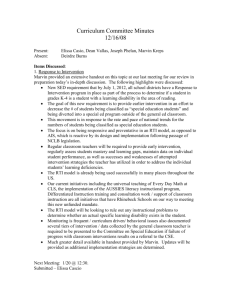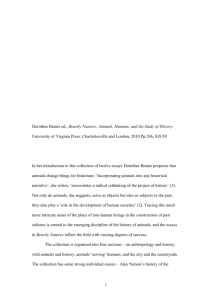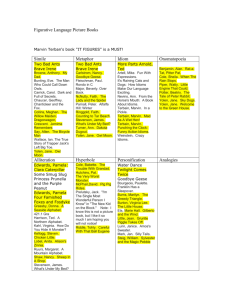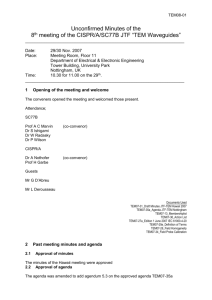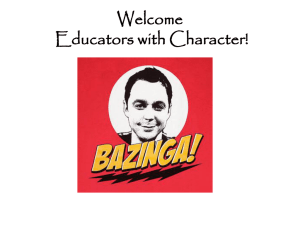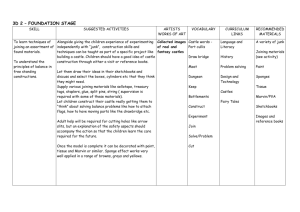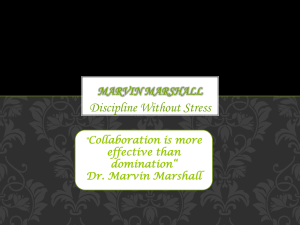Estrangement - Dr. Shalom Camenietzki
advertisement
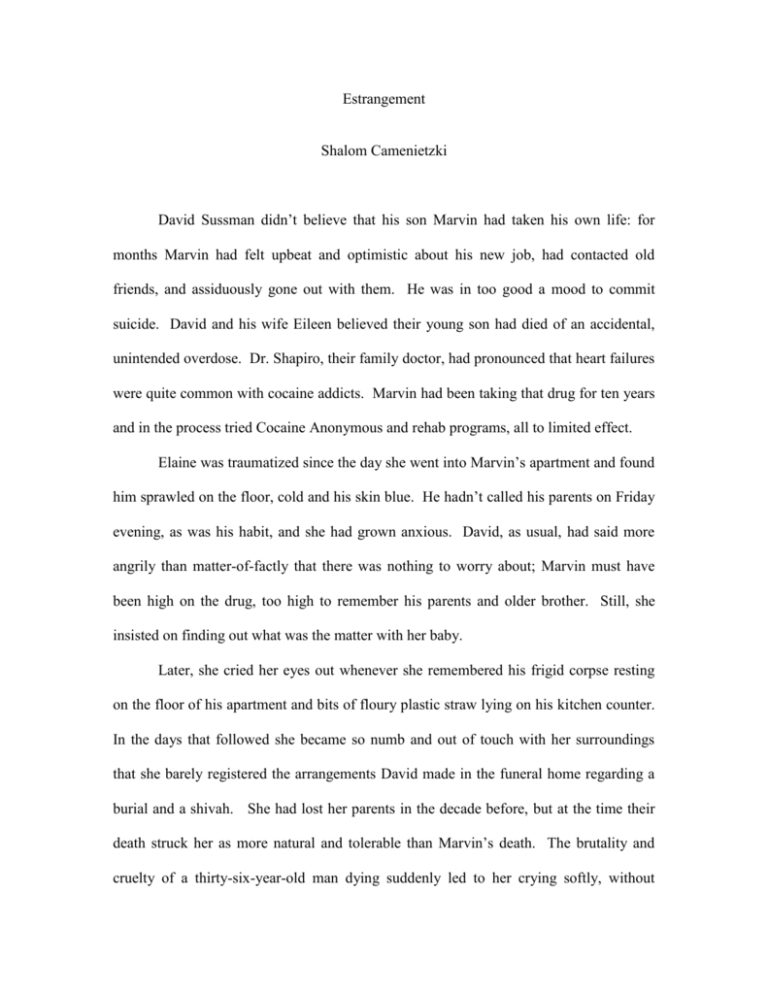
Estrangement Shalom Camenietzki David Sussman didn’t believe that his son Marvin had taken his own life: for months Marvin had felt upbeat and optimistic about his new job, had contacted old friends, and assiduously gone out with them. He was in too good a mood to commit suicide. David and his wife Eileen believed their young son had died of an accidental, unintended overdose. Dr. Shapiro, their family doctor, had pronounced that heart failures were quite common with cocaine addicts. Marvin had been taking that drug for ten years and in the process tried Cocaine Anonymous and rehab programs, all to limited effect. Elaine was traumatized since the day she went into Marvin’s apartment and found him sprawled on the floor, cold and his skin blue. He hadn’t called his parents on Friday evening, as was his habit, and she had grown anxious. David, as usual, had said more angrily than matter-of-factly that there was nothing to worry about; Marvin must have been high on the drug, too high to remember his parents and older brother. Still, she insisted on finding out what was the matter with her baby. Later, she cried her eyes out whenever she remembered his frigid corpse resting on the floor of his apartment and bits of floury plastic straw lying on his kitchen counter. In the days that followed she became so numb and out of touch with her surroundings that she barely registered the arrangements David made in the funeral home regarding a burial and a shivah. She had lost her parents in the decade before, but at the time their death struck her as more natural and tolerable than Marvin’s death. The brutality and cruelty of a thirty-six-year-old man dying suddenly led to her crying softly, without 2 words, while unwiped tears rilled down her cheeks. Relatives and friends tried their hands at consoling the grief-stricken mother, but their efforts were in vain. Elaine wailed that her life was over, and she would never be able to attain closure and put her pain into perspective. Though she allowed the mourners to hug and hold her, she declared herself too depressed and confused to write a eulogy for her son. On the day of the funeral, David sat with his family at the back of the limousine and marveled how his brother and sister and their spouses could make lively small talk while the car wended its long way to the funeral home. Once there, he felt light-headed and empty as he entered the auditorium where the coffin lay, and people perched on rows of chairs. He noticed only some of his relatives sitting on in the first two rows of chairs. Later, as he received relatives and friends at his home, he remembered how the hall was full of people but he couldn’t recall who attended the ceremony. David wept as he walked after the coffin, on the way to the grave. The crying and the tears filled his heart with sadness and wordless pain, and he welcomed those feelings. Now he felt real, after the numbness and emptiness while he and his remaining son read their eulogies at the funeral, and the rabbi gave a lukewarm and generic speech about Marvin. After the burial, Steve Singerman, Marvin’s best friend during university days, approached Elaine and David. His eyes red, and tears streaming down his cheeks, he bellowed, “Mr and Mrs. Sussman, I’m so sorry! I want you to know that Marvin’s friends and I feel devastated. What a tragedy! You must feel awful!” He approached Elaine and hugged her, probably because he needed support from a woman in this hour of 3 grief. Then Steve came up to David and put his hand forth. David clearly noticed how moist was the hand of his late son’s friend. Once at home, Susan Weinberg, Elaine’s sister, set a big bowl of water and a roll of paper towels by the entrance to the Sussmans’ house, so that those returning from the cemetery could wash their hands. Susan also sprayed long, white, powdery X’s on all the mirrors in the house, a modern version of the custom of covering mirrors with sheets. She had also made available halved bagels, soft creamy cheese, smoked lax, cakes, and coffee for those visiting the mourners at their home. Though Elaine had had experience with her two departed parents, she was deemed too shaken to take care of the customs of a house in mourning. David sat by a coffee table when Steve perched on a stair next to him. Steve was munching on a lax-and-cream-cheese bagel. It was obvious that he wanted to ventilate his feelings about Marvin’s death. “Mr. Sussman,” he said, “I feel terribly sorry about your loss. I – ” “Call me David,” David interjected. “‘Mr. Sussman’ makes me feel as ancient as the Rocky mountains.” He wondered from what source did he draw strength to make such a light-hearted comment. “Yes, David,” Steve said apologetically, “your eulogy was remarkably truthful to Marvin. You didn’t hesitate to mention how for ten years he did battle with the demons of addiction. That was so real, so open!” Steve took a bite of the bagel after peering at it. 4 “It had to come out. Marvin was a straight shooter, and he wouldn’t have liked me to embellish his eulogy with euphemisms. I called it an addiction and am glad you liked it.” “All his friends at the funeral liked the way you put it.” “Who?” His own curiosity piqued him. “Allan, Mike, Miranda, John. Way too many to list.” “How did they find out about the funeral?” “Allan and John saw the ob in the Toronto Star and passed the word around. One thing led to the other and we had a lot of Marvin’s friends coming to the funeral.” “I’m sorry I didn’t see who was in the audience. I was too confused and numb to appreciate details.” Steve lay his plate with the bagel on the coffee table. “Dozens of his friends came to the funeral. Marvin was really popular while at university. He was not forgotten, Mr. Sussman.” “David, please. I didn’t know he was still that popular. In the last years he withdrew from friends. He saw his family only once a month. I knew he had a wide circle of friends years ago, but I thought his buddies had disbanded when it became clear that he valued coke more than anything in the world.” “No, David. His friends didn’t desert him at all. We told him again and again to get help, go to CA, enter rehab. We never let go of him. We loved him. He tried to hide from his many friends, but no one gave up on him. We hoped he would find his way and be the same old Marvin he was at Dalhousie – witty, playful, insightful, a great friend.” 5 David bent toward Steve, as if to hear him better. “I was under the impression that in the last five years or so he was alone, lonely, and friendless.” “No!” Steve came across so animated and emphatic that a few people turned around to watch him. “He felt ashamed of changing jobs frequently and not being the star we had all expected he would become after university. But no one abandoned him. His old friends always hoped he would find his way out of the maze and kick the cocaine habit. Numbers don’t say all, but today at the funeral forty or fifty of his friends filled the auditorium.” David felt aghast. He and his wife had believed that their young son had led a very lonely existence in the last five years, when it seemed that he lived for the cocaine habit. How come his own father knew nothing about his friends? Why did Marvin conceal so much from his parents? Did David know at all the life of his son? He doubted the latter. “As soon as I’m alone with my wife tonight, I’ll tell her about Marvin’s friends. It’s a real consolation.” “My feeling is that Mrs. Sussman knew about what was going on with him. I talked to her a minute ago. She said she wasn’t surprised that so many of his friends turned up at his funeral. I have no idea what was going on, but Mrs. Sussman was not as surprised as you were just a moment ago.” David surveyed the room. Some five or six of Marvin’s friends had come to the reception at the home of the dead. How many of them would stay for the maariv evening prayers? He felt a hollow in the pit of his stomach. It was clear that a big chunk of his dead son’s life was unknown to him. What else didn’t he know? He remembered how 6 twenty or twenty-five years ago he had embraced the philosophy of tough love and acted on it. Elaine favoured a softer, more tender approach to their rebellious son, and they had fights about the right way of managing their difficult teenager. David almost smiled at the memory of Elaine’s fierce opposition to the concept of “managing” their son. “He’s not our underling,” she had yelled. “Your tough-love methods will just alienate the boy even more!” Now, at the reception, Steve excused himself, saying he would serve himself a cup of coffee; he asked David whether he wanted one. David thanked him but answered negatively. Once Steve left him, David felt a pair of huge pliers pinching his swelling heart. Three days later, during the shivah, as friends and relatives passed by to offer condolences, the intercom rang. It was Alex Barkin, Marvin’s friend from Dalhousie. He took a seat in the living room and before having a sip from his cup of coffee, he apologized profusely for not attending Marvin’s funeral days before. “I was out of town, winterizing my parents’ cottage. I found out about his death only yesterday.” “It’s very nice of you to visit us,” said Eileen. “It’s comforting to realize that Marvin’s friends liked him and remember him. It helps us tolerate the grief.” “Thank you for coming to the shivah, Alex,” said David. “We know you’re not Jewish, and we imagine you came because of appreciative feelings for Marvin.” “Yes, yes, Mr and Mrs. Sussman. “Marvin was more than a friend to me. I was a rebel while at McGill. I drank a lot and was into dope. Marvin was like a mentor to me. 7 He showed me the way. I know, he drank and did a lot of pot, but he had a positive influence on his friends. He was a leader who helped us see meaning and direction in life. His jokes were infectious. His joy and good humor affirmed life.” Eileen silently sobbed into her Kleenex. David felt a thick lump crowding his throat. He had viewed his late son’s university years as a parade of drunken days, a series of senseless stupor and hangovers. He had viewed his son’s life as a hedonistic, pleasure-filled affairs, having no purpose besides the search for irresponsible fun. Now that Alex spoke about Marvin’s leadership position, David felt perplexed. Was the Marvin Alex talked about the same person his parents were grieving? It hurt David that he didn’t know his son at all. It was painful to admit that they had been strangers and their father-son relationship was paper-thin and vacuous, for the most part. David blamed himself for this limitation. From early on he had rejected Marvin’s excessive drinking as intolerable, something a Jewish father couldn’t accept. “Goyim drink like pigs,” he had angrily told his son, perhaps too many times. Now he felt guilty about his judgmental, rejecting attitude. “Helen, my wife, is three-months pregnant,” Alex broke an awkward silence. “The baby is due next May.” “Congratulations!” Eileen and David rose from their seats and shook Alex’s hand. “It’s consoling to hear about new life when we’re mourning our son,” said David. Eileen buried her face in her hands. “I feel ashamed to admit it, but I’m terribly envious. You’re expecting a baby, while we will never have a grandchild from Marvin.” Alex smiled. “Helen was also a good friend of your son. We’re expecting a boy and decided that his middle name will be Marvin.” 8 “How thoughtful!” exploded Eileen, her cheeks still wet. She looked at David. “We’ll be very happy to buy the child’s crib! Right, David?” “Of course!” David followed up. “What will be the baby’s first name?” Alex’s face lit up. “Daryl. Daryl Marvin O’Keefe will be his full name.” “We feel so honoured,” said Eileen. “Will the child be baptized?” asked David. “We would be very happy to attend.” “I’m sorry,” Alex let out. “There’ll be no baptism. Helen and I are atheists.” “Marvin always stressed he was an atheist,” said Eileen. “One reason he didn’t like our Shabbat dinners.” David felt sad and puzzled. In the last five years of Marvin’s life David thought of his son as a drunkard without morals and principles, a man addicted to booze and drugs, leading a life of thoughtless pleasures and no consideration for others. Alex’s love for Marvin stirred David, made him wistful and perplexed. Was Marvin the mentor and good friend to Alex, the same person he had despised as a common boozer and cokehead? He felt sad, regretting the years of estrangement between him and his son. Now that Marvin was gone, he felt that the distance between them could never be bridged. His son was now a phantom, a memory he could sigh about, but not make changes. He had to bear his mistakes, especially his poor judgment of his son. “What else,” he wondered as he thought about what Alex had said, “did I miss about Marvin? What else did I fail to realize? Why was I so judgmental and rejecting?” A wave of loving feelings came over, but it was too late, he felt, to correct perceptions and opinions of Marvin. He could only learn to accept his mistakes and live with the guilt they entailed. 9 Days after the shivah ended David and his older son Harry went to Marvin’s apartment, to clean it and put it in order. They vacuumed and mopped floors, washed dishes and polished the kitchen, placed old clothes in black garbage bags, and collected his books in cartons. This task was enormously saddening, as if burying Marvin a second time. Both of them worked fast and hard, without uttering a word. Just before ending that lugubrious job, they made order in Marvin’s bedside table. In the top drawer David found a black notebook tightened by a rubber band. Curious, he sat on Marvin’s bed and riffled through the notebook. He came across handwritten passages and drawings, all undated. He read the first passages and it soon became clear that it was Marvin’s journals. “Harry,” he called his remaining son, who was setting the kitchen in order. “Come, see what I found.” Harry came over, took the notebook in his hands, read pages in the middle and end. “It’s a diary. Looks like he jotted down thoughts and feelings.” He read a few pages. “Dad,” he asked while perusing the booklet, “do we have the right to read something so personal?” “Why not, son? After all, it’s part of what he was and we, his family, inherit whatever he was, good or bad.” “I don’t know, Dad.” He shook his head. “Perhaps he never meant for others to read it. It’s not a public document, even if he’s dead. Look at this,” his forefinger 10 pointed at a drawing of a man lying on the floor, eyes closed, several bottles standing close to his head. The caption below read, “Black Despair.” “I’m not sure Marvin would have liked us to go over something so intimate,” Harry looked at his father with firmness. “We’re his emotional heirs,” David hurried to reply. “We’ll understand him better, and in greater depth, if we get in touch with personal material. In the last few years he kept distance from the family. We have the duty of getting to know him better now that he's no longer with us. It’s our last opportunity to connect with him.” “I don’t know, Dad,” Harry shook his head slightly. “People have a right to confidentiality, even after their death. I’m afraid we’ll find out stuff he didn’t want us to know at all.” “Harry,” David sounded solemn, “now that Marvin is dead I want to know every bit of him, even if hurts me or your mother. I think you got caught up in notions of confidentiality, when closeness to him is what matters. Yes, I’m afraid that what I’ll read may not be pretty, but I still want to read it. “Suit yourself!” Harry raised his voice. “I have no intention of violating his privacy! And please don’t share with me what you find out. I don’t want to know things my brother concealed from me.” “I heard you, son,” David spoke softly. Now that he had only one son left, it was imperative not to ruffle feathers or create animosities. “I’ll keep to myself whatever I find out. I’m sure your mother will do the same.” It was late afternoon when David came home from cleaning Marvin’s apartment. “How did it go?” asked Eileen. 11 “It was very sad to put his stuff in boxes and bags,” replied a long-faced David. “It looked so final and irreversible. After we sell his apartment it is as if we deleted him from the physical world. He remains only as memories, spirits, ghosts.” “I’m glad we have so many photos of him as a kid and teenager,” Eileen chimed in. “Once he started drinking, he wouldn’t allow you to take pictures of him. Do you think he was embarrassed?” “Probably. He gained weight from drinking so much.” He pulled out the notebook from his pocket. “Look, Eileen, I found his diary. Harry doesn’t want to know what’s in it. He wants to respect Marvin’s confidentiality. I’ll go over the diary, then let you read it.” “I want to go first,” she stretched her splayed hand. “I am the mother.” David gave her the notebook. He went to the living room and turned on the TV, hoping to get the news. After about half an hour he puzzled how come he hadn’t heard from his wife. He strode to their bedroom and found her sprawled on the bed, her face buried in the pillows, the notebook lying nearby. She was crying. “What happened?” he asked, alarmed. “The notebook…” she gasped, “it’s horrible…terrible…very painful.” She sat up in bed, her hands grabbing her hair, as if to pull it out. He got hold of the notebook and, sitting on the bed, began reading it. The diary was a jumble about booze, drugs, Alcoholics Anonymous, a Dr. Greenberg, names of women and their phone numbers. Most passages started with “I” and went on to comment on depression and despair. At one point, numerous “HELP!” crowded the page. Later, there were thoughts of suicide followed by “I must put an end to the 12 suffering.” In one page Marvin had written “loser” and “piece of shit” some twenty times, like a doing a punishment meted by an angry teacher. David came across a paragraph where Marvin argued back and forth whether he was going mad. The passage ended with “talk it over with Dr. Greenberg.” There were references to coke, vodka, and painkillers. The notebook ended with pages about fucking hopeless junkies. After he finished reading the notebook, David stretched in bed and studied the ceiling. How little he knew his son! He’d thought Marvin was a fast-living man, a hedonist who would do anything for a buzz or a thrill. What he’d just read spoke of pain, despair, and self-torture. And yet, David had seen nothing! “Perhaps I didn’t want to see?” he wondered. “I gave up on Marvin when he needed help, not scolding!” He turned on his side. Eileen was sobbing softly, and he envied her tears. He wished he could weep and relieve the pressure in his throat and upper chest. How come his son trusted him so little? Was he such a lousy father? The thought that Marvin had trusted neither his mother nor his brother brought no consolation. Yes, he was to blame for the gulf between father and son! And this was not the voice of grief speaking, he told himself. To be impartial and objective he admitted that it was all his fault. He’d condemned Marvin without understanding the person who filled the pages of the awful notebook. How neglectful, how sanctimonious! What lay ahead, he asked himself. How could he go on living? As he shaved in the morning, how would he look in the mirror, knowing that he’d failed so badly as a father? He turned around. Sobbing, Eileen was lying on her back, one arm covering her eyes and nose. He recalled her saying, “I am the mother” and concluded that no matter 13 how he suffered, she was probably suffering even more. However vulnerable he felt, his wife must feel even rawer, more fragile. He caressed her arm, telling himself that to allay his guilt he better soothe hers.
